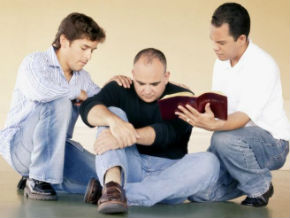The religion x homosexuality debate involves a lot of controversy and is always causing an uproar in the media. With each piece of news broadcast, we realize that it is a discussion that is far from finding an outcome, quite the contrary, with each new topic, it carries the label of being extremely flammable: on the one hand, those who contest homosexuality at the religious core, condemning gays and using the Bible as a reference to explain the reasons for demonization. On the other, individuals who fight for a better interpretation of the Bible and who preach respect and freedom for homosexuals, claiming that discrimination is not part of the proposal of love preached by the same book that men use as a reference for God's teachings. In the middle of it all, those who just observe the debate.
The discussion of homosexuality through religion passes through two very different hands. There is the possibility of condemning it, claiming it to be a sin worthy of death, as is the case in some Eastern religions. Other religions, not as strict, condemn the practice, but do not suggest capital punishments. However, there are also those who, even imbued with religious discourse, preach love for others and make a more contemporary interpretation of biblical studies, placing such interpretations in the context in which the Bible was written, importing them into current times and giving them a new look.
The film Prayers for Bobby addresses the issue of religion x homosexuality through conflicts established within the family.
AT THE MOVIES
Prayers for Bobby, directed by Russell Mulcahy, presents a very didactic narrative structure for discussing the topic of religion x homosexuality. It is an adaptation of the book of the same name released by Leroy F Aaron, without translation into Portuguese. In the film, Sigourney Weaver plays Mary, a dedicated and religious mother, who values so-called Christian values within her home. Both at dinner and at family gatherings, dialogues between her, her husband and children navigate the tide of biblical teachings.
Prayers for Bobby Scene

Things begin to get tense at home when he is informed by his eldest son that Bobby (Ryan Kelley), his beloved and companion at domestic movie sessions, is gay. From then on, the intense search to save their son from mortal sin leads the family to plunge into a painful tragedy. Bobby, unable to withstand the pressure and distancing himself from his mother, becomes even more fragile than he really is and commits suicide.
From the pain that Mary will begin to change her thinking and understand biblical teachings from a different perspective. She seeks help in readings, support groups for homosexuals and the reverend of a church that in the past, was visited by young Bobby in a moment of anguish. It is during one of these trips to church that the film perhaps presents its best dialogue. Tense, Mary seeks answers from the reverend, trying to understand the reasons why he accepts homosexuality with such lightness and respect. When citing biblical passages in the discussion, she is contemplated by opposing interpretations of what she carried as truth.
Through pain, Mary sets out in search of redemption, demonstrating as a representative of homosexual rights. It took the tragic event for her and her entire family to better understand the issue and distance themselves from the strict religious dictates presented in most of the film.
HOMOSEXUALITY IN RELIGIOUS DISCOURSE
The topic is controversial and dates back to ancient times in the history of civilizations: in addition to being established in Babylon and Canaan, in ancient Greece, love between men was very common. The armies of Thebes and Sparta, for example, made sacrifices to Eros, god of love, and later formed relationships, before entering into bloody combat.
For Jews, homosexuality is a sin and in ancient times, it was punished with capital punishment (death). The reference book is the Torah, which, according to followers, provided for the penalization of homosexuals, who were persecuted for a long time, especially during the expansion of Christianity. In one of the film's opening scenes, during Bobby's grandmother's birthday, while one of Mary's children plays with a purse and simulates an affected posture, the grandmother claims that "queers should be lined up and shot." Prejudice doesn't just come from Bobby's character's mother, but from almost every member of the family. Interestingly, the father, who according to society's normative standards, represents the sexist element of the relationship, seems to be the calmest one, seeking to better understand Bobby's situation.
In the Christian tradition, Catholicism condemns homosexuality and uses the biblical books Genesis, Leviticus and the Letters of Saint Paul as support for this condemnation. Protestantism, despite the lack of approval by some representatives, compared to
Catholics are more malleable. Denmark, a country with a high Protestant population, was one of the first places to recognize the rights of homosexual unions. For Spiritism, the spirit has no sex and the same spirit can, in different incarnations, inhabit the body of a man or a woman. Indoctrinators such as the medium Divaldo Franco take a position without condemning homosexuals, informing that what will be observed is moral conduct, regardless of the individual's sexuality.
Islam considers homosexuality to be a form of misconduct, and in countries such as Iran and Saudi Arabia, homosexuals were punished by death. Other nations, such as Pakistan and Algeria, condemn homosexuality with imprisonment, fines or corporal punishment.
Neopagan religions such as Wicca do not take a stance against homosexual conduct. In the case of Buddhism, there is no major problematization of the issue: the religion only preaches distancing from worldly practices.
In general, religions debate the founding myth of nature, the moment in which God created man and woman, one for the other, with the intention of procreating.
According to researcher Regina Soares Jurkewicz, also a professor of the Religious Phenomenon discipline at the Instituto Superior of the Diocese of Santo André, in São Paulo, much of the discussion about homosexuality in religious discourse focuses on finding out what the Bible has to do with say about the topic. This is what the character Mary, from the film Prayers for Bobby, does most of the time. She seeks, both before and after her son's tragic death, support in the sayings of the Bible to resolve the doubts that arise throughout the plot.
More recently, the topics of homosexual union and adoption have provoked intense debate in the media. It is another controversial topic on the subject. According to Luís Correa Lima, from the Pontifical Catholic University of Rio de Janeiro, the Catholic Church has already announced that homosexual unions would be harmful to the progress of society and inserting children into unions of this type through adoption means a practice of violence against them, because their state of weakness is taken advantage of to introduce them into environments that do not favor their human development.
In the field of theologians who defend homosexuality, we have the Anglican Norman Pittenger, who speaks about the dignity and honor of homosexuals, similar to any heterosexual. When affirming the non-sinful character of homosexuality, Pittenger follows the same spiritist thought, a religion that in Brazil finds a very representative name in Chico Xavier: what is observed before God is the moral conduct of each person, regardless of whether their relationship is homosexual or heterosexual. Interestingly, the thinking of Catholic theologian John McNeill is in line with that expressed by Pittenger, mainly when he says that moral rules apply to people with homo or hetero behavior, the only thing that matters is that people have relationships with responsibility, respect and tenderness.
*Article originally published in Revista A Capa #58



